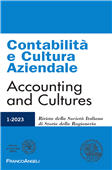The Church and the art of governing people in a period of crisis : an analysis of the Inchiesta Innocenziana (1650-55)
39-59 p.
Introduction. The focus of this work is the Inchiesta Innocenziana (Enquiry by Pope Innocenzo the 10th) upon the monasteries of the Italian States in the mid-17th century. Aim of the work. This study intends to demonstrate that in the Church, in the mid- 17th century - around one century later than in the European States - economics is introduced in the art of government as the correct manner of managing individ- uals, goods, and wealth in action at a distance. Methodological approach. The study is based on the investigation of primary and secondary sources related to the Inchiesta Innocenziana. The study analyses the various aspects and specially chosen techniques which, in a period of crisis, led the Catholic Church to run one of the first large-scale 'auditing' upon its 'branches' (monasteries) located within the Italian States. Main findings.
It is shown, through an interpretative approach, how the Church worked inspired, not by the Law of God (human, natural, and divine), but by the art of governing people, as described by Foucault, giving techniques and practices for a concrete form of political rationality. Originality. The paper considers the relevant emergence of accounting and accountability practices, in a power/knowledge scheme, in decisions regarding a reconstruction after a crisis, by a complex interacting organisation such as the Catholic Church of the mid-17th century. [Publisher's text].
-
Articles from the same issue (available individually)
-
Information
ISSN: 2283-7337


